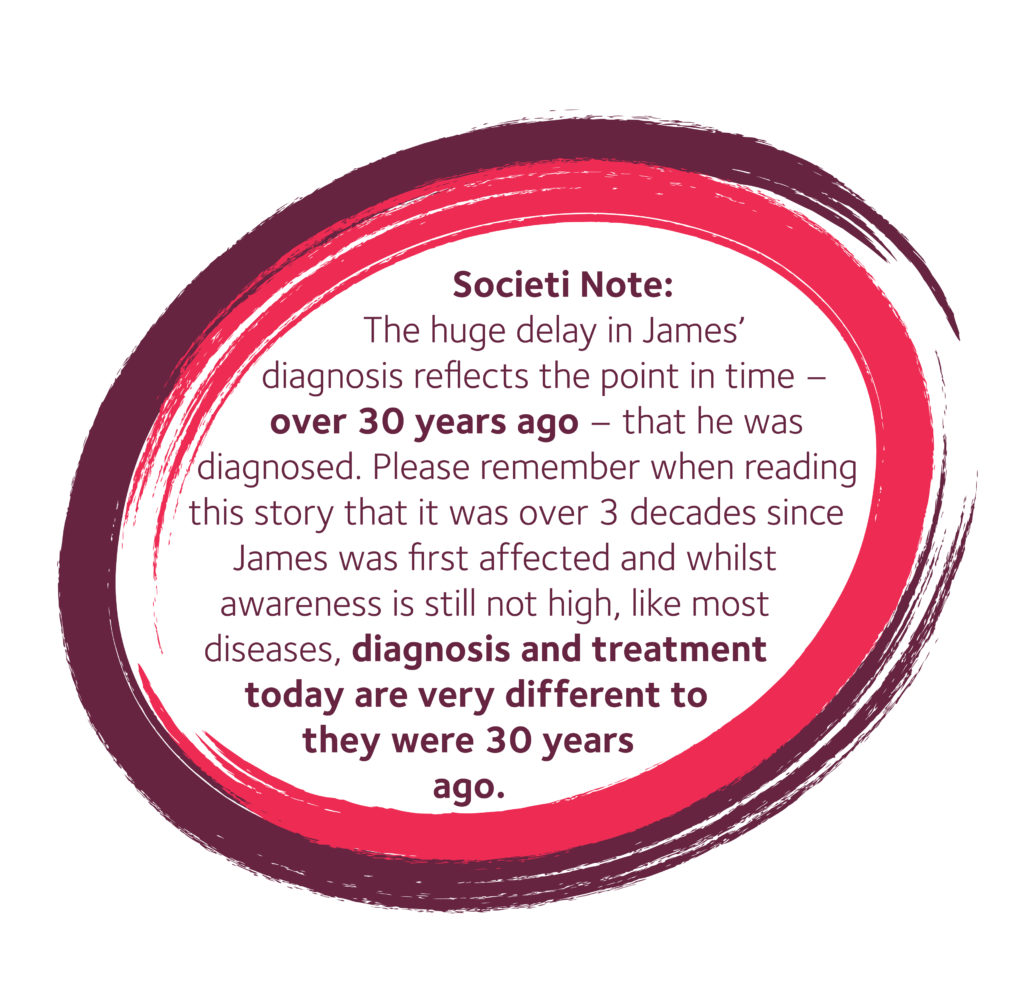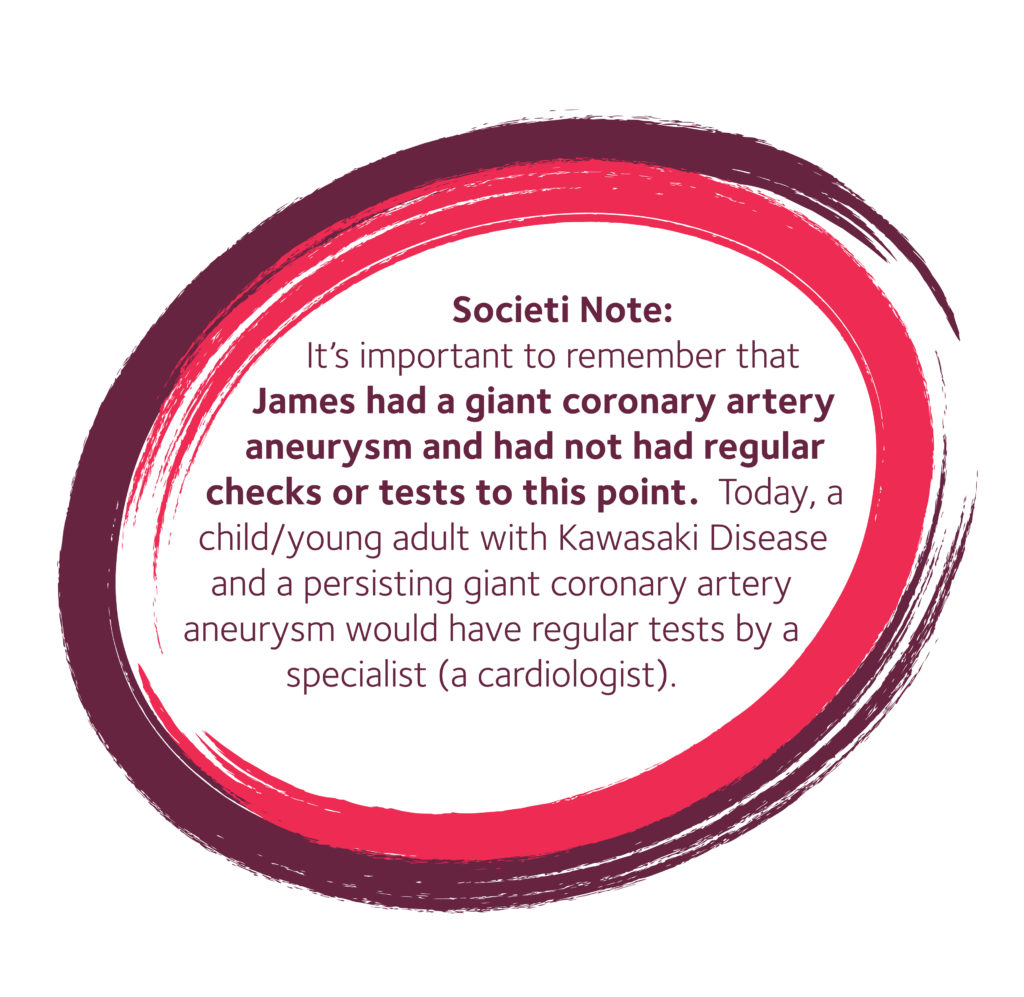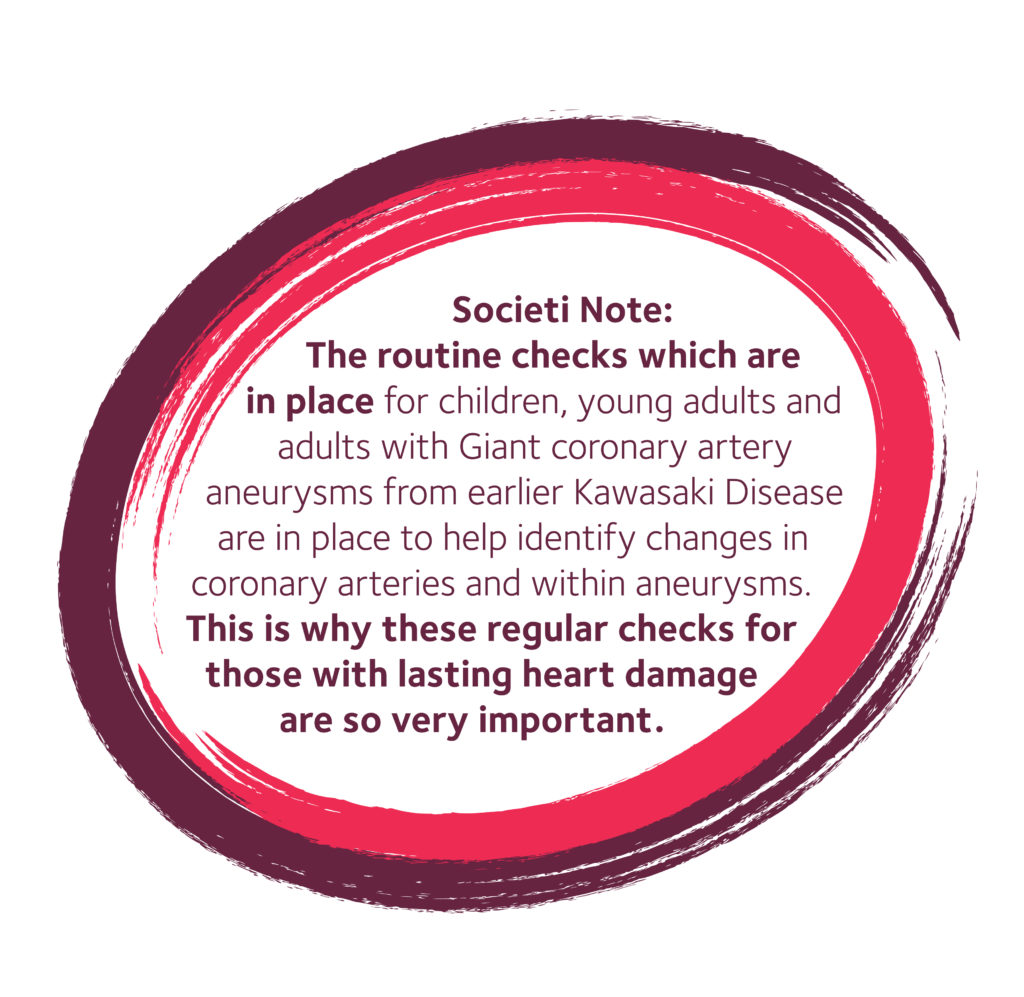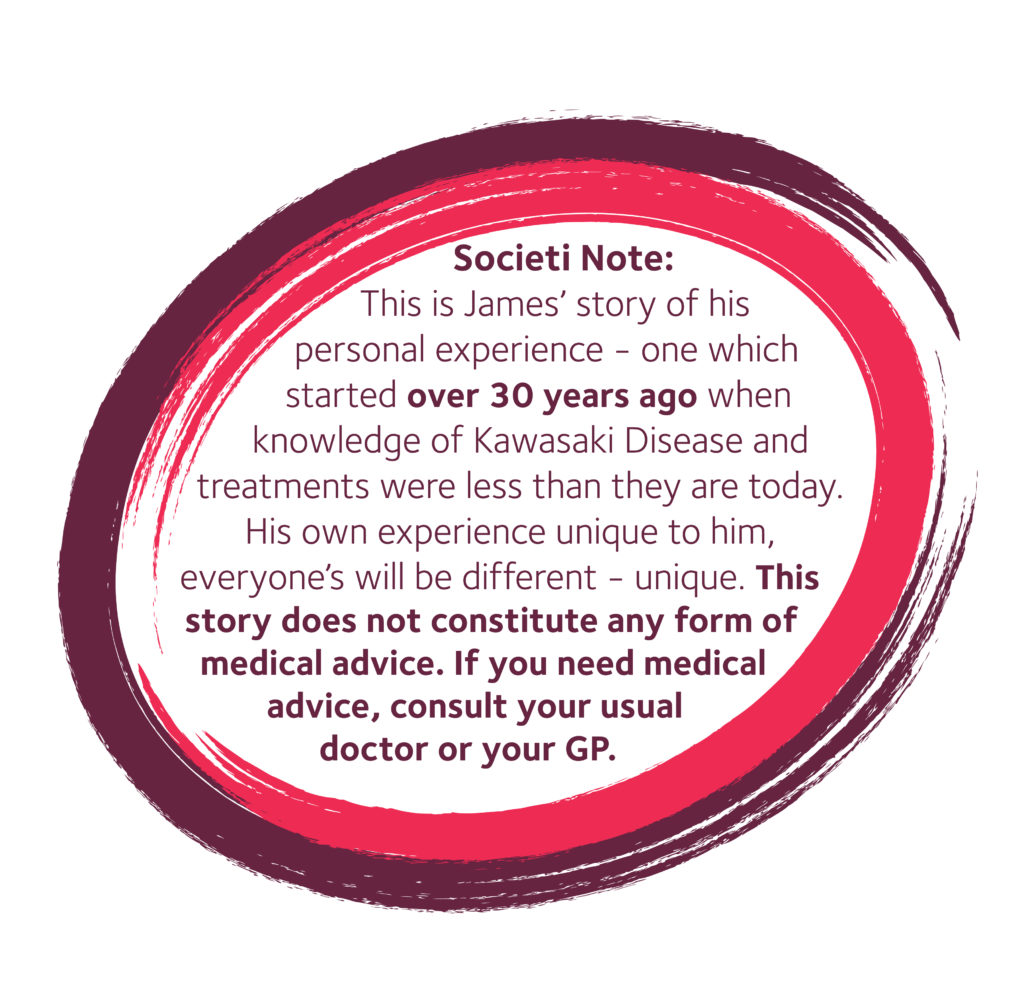 Sharing Experiences of Kawasaki Disease
Sharing Experiences of Kawasaki Disease
It’s Unique…
Just as the symptoms of Kawasaki Disease present uniquely on every child, from our conversations with families it’s clear that everyone’s experience of Kawasaki Disease over time is unique too – although there is much we can learn together by sharing our experiences. Generous Societi Supporters have shared – and continue to share parts of their experience, so that these might help other families and patients. Our Family Stories on film, within our Family Resource Portal are great examples of these.
On this page we’re developing a series of further shared experiences which we hope will add more insight and be a source of information and help as you follow your own, unique Kawasaki Disease Journey. Once affected by Kawasaki Disease, there can often be so many questions about your child’s future, and what Kawasaki Disease will mean for them. It’s not possible to know all the answers for what lies ahead and this is one of the many frustrations of Kawasaki Disease – so little is known. So it’s just not possible to answer all the questions that parents and patients have. But what we can do is try and share experiences to give a glimpse of insight where otherwise there might be no insight at all.
We are very grateful to the wonderful Societi Supporters who have contributed to this page. If you’d like to contribute to this page, please contact us.
It’s important to remember that the experiences shared here are personal stories and DO NOT constitute any form of medical advice. Consult your usual doctor or your GP if you need medical advice.
James’ Story
Read the full experience ▼
So here it is – James’ Story
Back in 1985, being just a few months old, I was taken into hospital with an unexplained fever, a patchy red rash and peeling of my skin. According to what I’ve been told by my parents, the doctors were perplexed. About six months later, I was formally diagnosed with Kawasaki Disease.
 As a child I remember spending hours in the cardiac outpatient department of Alder Hey hospital and the process of getting an ECG, an echo and then seeing the Doctor. Occasionally, as I got older I would also have an exercise tolerance test and on two occasions I had a coronary angiogram. I was 8 years old when I had my first angiogram and 12 when I had my second.
As a child I remember spending hours in the cardiac outpatient department of Alder Hey hospital and the process of getting an ECG, an echo and then seeing the Doctor. Occasionally, as I got older I would also have an exercise tolerance test and on two occasions I had a coronary angiogram. I was 8 years old when I had my first angiogram and 12 when I had my second.
As a teenager I was quite naive and didn’t really know about how the disease had affected me. I was a happy, very active “normal” teenager – playing football competitively twice a week as well as any spare time in between.
As I got a bit older and I began to take more of an interest in the disease and my well-being. I learned that the disease had left me with quite a large aneurysm in my main coronary artery – this was a permanent aneurysm. I was told that we would know by the time I turned 21 (fully grown) whether or not I would need a procedure to fix the problem that the giant aneurysm was causing – likely a stent or worst case scenario, a bypass graft.
When I graduated from University I became a Cardiac Physiologist – an Echocardiographer and Pacemaker Technician basically! This was completely coincidental to me having the heart problem, believe it or not. I didn’t aim to have a job that would link to my own personal life so intimately. Honestly, I didn’t!
Towards the end of 2010, at the age of 26, my Consultant decided it would be a good idea to get an updated angiogram.  At this point I had no symptoms – playing sport twice a week and staying pretty healthy. However, as soon as the doctors had finished the angiogram they explained that the artery had become blocked
At this point I had no symptoms – playing sport twice a week and staying pretty healthy. However, as soon as the doctors had finished the angiogram they explained that the artery had become blocked
They went on to advise that although a stent may be able to fix the problem (a procedure similar to the angiogram in which a balloon is used to deploy a metal cage to open up the artery), it looked more likely that I would need a bypass graft to fix it.
Eventually a date was set and in June 2011 I was booked to have a coronary artery bypass graft (CABG) in Manchester Royal Infirmary. It was a weird time for me. I had a two month old daughter, I was busy in work and with study, and I was also caring for my mum who was ill at the time. I suppose this put the thoughts of my own health at the back of the pile.
At no point in the lead up to the surgery did it enter my mind that something could go wrong, or that I wouldn’t make it out. My wife finds it hard to believe that I didn’t think about the worst, but I didn’t. I can’t explain why but there you go. I suppose I just knew it wasn’t my time, and I’m usually a pessimist!
Anyway the procedure was performed and in fact I had two grafts during the operation, both taken from the internal mammary arteries, so no veins/arteries were taken from my legs or arms as is sometimes the case, and the procedure was a complete success. I then spent a fairly uneventful five days recovering in hospital before going home.
After just under 3 months off work, I returned and soon got back into the swing of things. My life returned to normal (albeit with the new baby!) and we were happy to announce that we would be having a second child in the following May.
I started running and was back to my normal level of health and fitness soon after. I now play sports regularly including football and I cycle as much as my busy schedule allows, aiming for 2-3 hours of vigorous exercise a week. Today, I watch my diet, monitor my exercise – I wear a fitbit and aim to walk 15000 steps a day, which I more often than not manage. These are lifestyle things I choose to do rather than specific advice I’ve been given – but looking after myself is important for myself and my family.

So, after almost 7 years since surgery I remain on 3 cardiac medications (Aspirin, Simvastatin and Losartan) and have regular follow ups with my Cardiologist. That’s my particular regime! I’m relatively fit and healthy and enjoy a completely normal life. Kawasaki Disease has been part of my life but I think it’s fair to say, it’s never been a main part!
I hope sharing my experience has given some insight into what it’s possible to achieve – which is actually a pretty normal life from my perspective – as well as the sorts of challenges which can be faced when living with the consequences of Kawasaki Disease.
Societi Professors Comment
James was diagnosed with Kawasaki Disease back in 1985, and we know from his story that this diagnosis was very much delayed. His heart was very badly damaged as a result.
Whilst awareness of Kawasaki Disease is low today, in 1985, very few people in the U.K. knew Kawasaki Disease and James was in that respect, fortunate to get a correct diagnosis in 1985 – perhaps that was because he was so seriously ill.
The Kawasaki Journey James describes is one which reflects the time he was diagnosed – which it’s important to remember was over 3 decades ago. If diagnosed with Kawasaki Disease today, your own acute medical care and future care would be different. We know more today about Kawasaki Disease and are learning all the time.
But James’ remarkable experience and the determination he shows in his story are powerful and positive experiences to share. Because they demonstrate that even after facing immense challenges as an infant because of Kawasaki Disease, with support, with expert clinical treatment and the right lifestyle choices, a full and rewarding life is very much a possibility.
Has James’ Story prompted any questions?
James has offered to try and respond to questions if you have them, on his own experience, as far as he is able – remembering of course that he’ll be doing this just as a patient, from his personal experience, NOT as a medical professional. If you’d like to ask James a question, please use our Contact Us form here https://www.societi.org.uk/contact-us/ and start your text with “Question for James”. Please note that if we have a number of similar questions we’ll gather these together and post a reply to the general topic rather than individual questions.
Questions and replies won’t be sent personally but will appear on this page to benefit all our Societi website visitors.
Want more information?
You’ll find more information throughout over 70 pages of our website, on many aspects of Kawasaki Disease.
To hear more from one of our Societi Professors, on Kawasaki Disease, click https://www.societi.org.uk/family-resource-portal/societi-professor/
For information on what to expect today from a Kawasaki Journey, go to our Family Resource Portal here https://www.societi.org.uk/family-resource-portal/my-kawasaki-disease-journey/
For information and videos which you can share with your child on tests involved in Kawasaki Disease treatment and longer term care, click https://www.societi.org.uk/family-resource-portal/hospital-tests/
For questions to ask your doctor at your next clinic appointment, go to https://www.societi.org.uk/family-resource-portal/clinicals-facts-info/questions-ask-doctor/
For ways to raise awareness of Kawasaki Disease within your own community and fundraise, go to https://www.societi.org.uk/fundraising/getting-started/
Being Strong
Read the full experience ▼
…..When my son was in hospital I heard the words “You’ve got to be strong”, “You are being so strong“ “Keep being strong…” But was I really strong? Or was I forced in to a situation where I had no choice and no control? A situation where I had never heard of Kawasaki Disease and had no knowledge of the road that we were about to go down, I certainly did not want to be in this situation. However there was an expectation that I had to be “strong” so I could be the best advocate for my child to keep him strong. Where does being strong end? After all we are not all born with the same level of strength are we?
I wonder what being strong actually means – and how you know if you are “strong”….. When I looked up what “strong” means everything that came up was to do with physical strength. Yet what I needed – and what I drew on when my son was seriously unwell was my emotional and psychological strength. These were “hidden” within me though and at times, really not that strong! And it was difficult, really difficult to keep being “strong” on the outside when I wasn’t always coping on the inside.
And just because I didn’t ever cry in front of people it didn’t mean I didn’t cry tears inside…. did that make me strong? Because I didn’t ask for help – did that make me “strong”?
No. It didn’t.
So I guess my learning is that being asked to be “strong” might be – and almost certainly always is – well intentioned, but it’s not a helpful thing. Because “strong” does not mean you are not allowed to cry, it does not mean you have to cope on your own. It does not mean you shouldn’t reach out for help. It doesn’t mean you’re assumed as having all the coping strategies and skills!
It means cry as much as you need to but be willing to carry on after that. It means lean on whoever you need to, they will be there to help. It means ask for help when you need to – it will make the next step a little more bearable. Being strong doesn’t mean you avoid the truth instead you accept it, learn about it and then deal with it – together. Being strong does not mean you need to accept being emotionally shredded – support is there; it’s ok to reach for it. Being strong means you are getting there every day, little by little. That is real strength.
Being strong is walking through a journey like many of us have been through and genuinely accepting that it is ok not to be ok and to ask for help when you really need it.
Resources
We’ve shared a link with below on emotional first aid – a TED Talk which is about 15 minutes long. It’s not specific to parenting or to having been through the experience of having an unwell child — but just talks about the importance of all of our emotional wellbeing, and offers some really great tips on improving that. We love TED Talks, and if you’ve a little time to watch this one, it’s a TED Talk we’d really recommend!
#ForOurChildren #TEDTalks #TeamSocieti ????
You can find out more about the Mental Heath Foundation and their resources here:
https://www.mentalhealth.org.uk/your-mental-health

